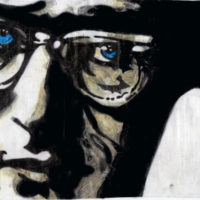 “The Tony Bennett/Bill Evans Album” remains, for me, one of the three or four most engrossing vocal jazz recordings — along with Sinatra’s Jobim collaboration, Ella performing with Satchmo and Nat “King” Cole’s “After Midnight.”
“The Tony Bennett/Bill Evans Album” remains, for me, one of the three or four most engrossing vocal jazz recordings — along with Sinatra’s Jobim collaboration, Ella performing with Satchmo and Nat “King” Cole’s “After Midnight.”
But what made the initial Bennett/Evans project, and its follow up — 1976’s “Together Again” — so special was not just that hearing a big-band singer like Bennett in such an unadorned context was unusual. Evans doesn’t simply provide a supporting presence for the singer; instead he and Bennett brilliantly trade ideas back and forth — improvising with word and deed, not just combining their towering talents so much as opening an engrossing conversation that intertwines their very different personas.
Bennett and Evans had been brought together by jazz singer Annie Ross. They’d met in passing over the years, and Bennett of course had recorded Evans’ “Waltz for Debby,” but the men didn’t know one another well when the first sessions were held for Bennett’s new Improv label. That feeling-out process, explored more completely on this compilation’s second disc of alternate takes, is part of the bright joy of discovery surrounding the collaboration.
There was no advance practice, no worksheet with suggested tunes. One or the other of the two men, in a studio with only producer Helen Keane and an engineer, would suggest something. They’d work out a key, do a run through, then put it on tape.
Interesting, too, then were the songs that occurred to them.
Almost a throwaway in 1975, Leonard Bernstein’s “Some Other Time” (from “On the Town”) became something of a jazz standard after this Bennett/Evans reworking. Likewise, few had ever really examined “Who Can I Turn To,” originally from a small Broadway hit production, before this.
“Young and Foolish,” embedded below, had been recorded separately by both Bennett (on 1962’s “This Is All I Ask”) and Evans (for 1958’s “Everybody Digs Bill Evans”). Together, and with the lightest of touches, they made a track once part of the early 1950s show “Plain and Fancy” new again.
 In contrast, by the time Bennett and Evans convened a year later for “Together Again,” the two had appeared countless times together. Still, the tunes were again selected on the spot, though no doubt informed by shared concert experiences in places like the 1976 Newport Jazz Festival, among others.
In contrast, by the time Bennett and Evans convened a year later for “Together Again,” the two had appeared countless times together. Still, the tunes were again selected on the spot, though no doubt informed by shared concert experiences in places like the 1976 Newport Jazz Festival, among others.
The juxtaposition of personalities — Tony Bennett, the expansive crowd pleaser; Bill Evans, the introverted instrumentalist — remained a source of satisfying artistic friction.
Bennett found undiscovered depths of understatement, while Evans (notably on the rousing solo opening to this second collaboration, “The Bad and the Beautiful”) explored a dynamism that might surprise listeners more familiar with his quietly focused trio recordings.
Meanwhile, “But Beautiful,” from “The Tony Bennett/Bill Evans Album,” illustrates the singer’s complete command of his craft — even as Evans adds quiet interjections. They have enough tension in their styles to turn a even jokey tune like “When In Rome,” previously recorded by Peggy Lee and Bobby Short, among others, on its ear.
They make an easy go of “Lucky To Be Me,” also from “On the Town,” then take an even more contemplative tack on “Make Someone Happy,” another formerly happy-go-lucky showtune. This version of the rather complicated “You Must Believe in Spring,” closing out “Together Again,” is uncluttered and definitive.
Notable extras in this new expanded release include a terrific alternate take on “Who Can I Turn To,” and a rare third version of “The Bad and the Beautiful.” Evans, and this is such a thrilling part of the extra album, never plays the same way twice.
Bennett had already long since come into his own as a big-voiced interpreter of classic American songs, but one who had never completely summoned this level of sensitivity. Pairing him with Evans, until the end delicate and piercingly honest, drew out something new in both.
The pianist succumbed to an on-again, off-again battle with drugs almost exactly four years after the second recording with Bennett.
- Nick DeRiso’s Best of 2015 (Rock + Pop): Death Cab for Cutie, Joe Jackson, Toto + Others - January 18, 2016
- Nick DeRiso’s Best of 2015 (Blues, Jazz + R&B): Boz Scaggs, Gavin Harrison, Alabama Shakes - January 10, 2016
- Nick DeRiso’s Best of 2015 (Reissues + Live): John Oates, Led Zeppelin, Yes, Faces + others - January 7, 2016




